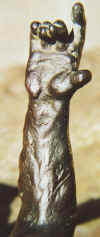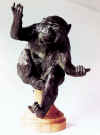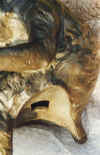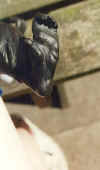| |
Description of the monkeys
|
Handling the monkeys for hours is essential but a brief
description might be useful to highlight features which may escape even the most
perceptive eye, for to see is not always to perceive. The monkeys cannot be understood if
examined in a poor or artificial light for a few seconds or minutes and as with all
Renaissance bronzes an opinion given on photographs has little value as bronzes are three
dimensional. They should be examined in a good light to see the colour of the metal. (10)
The two monkeys although finely
cast have not been fully worked up, but some parts have a hammered finish. It is obvious
that the pose of the arms and hands is contrived as for a purpose, yet even here they are
accurate, for the monkeys are life-like, remarkably so, and the sculptor could only have
copied from a real monkey such is the wealth of detail (but not cast from a real monkey).
Their style is life-like. Monkeys do not keep still so perhaps if the artist modelled from
a real monkey it was deceased. The handling of the fur is especially subtle. The head
tilts to the right most realistically.
One monkey has a matt surface
finish and in a good light the colour is a reddish brown which fluctuates in intensity.
The other monkey has a shiny surface finish of a darker brown with a green tint and the
front has been weathered but the back has been protected and is in a good state. This
monkey has two holes on one of the legs surrounded by a "halo" of brown
corrosion material.
The outside of the fingers have
been fully worked up, but not the inside of the fingers nor the palms or the arms and
front of the body which have metal accretions still attached. The fingernails have been
manicured and the prehensile feet and toes have been worked up also. There is evidence of
corrosion but they are in a fairly good condition. One of the monkeys has a heavy
encrustation of corrosion material inside. There are traces and remains of yellow deposits
and stains to the front and sides of both monkeys, but not the back. Also yellow stains
are to be seen inside one monkey.
They are 12 inches (30.5 cm) high,
9 inches (22.9 cm) deep, 8 ½ inches (21.6 cm) wide. They each have an unusual curved base
in to which is cut with some care a large square hole for means of attachment to a pedestal
or support of some kind. Seam marks from the piece moulds can best be seen on this curved
base and can be traced over the body of the monkeys. There are plugs visible, crown of
head, middle of back, heel of foot, etc. The tail is small and hammered. They are not
signed.

 |










|
|
Previous Page |
Contents |
Next Page |
|
|